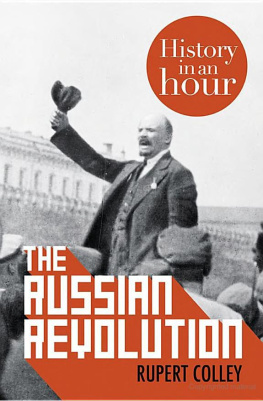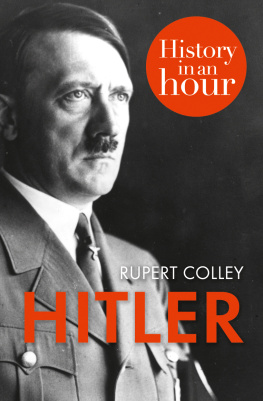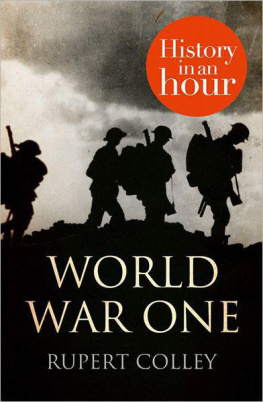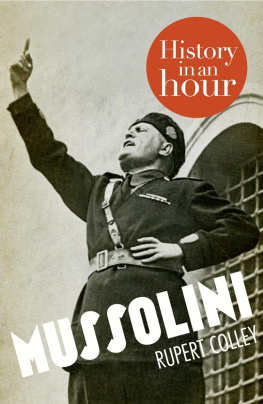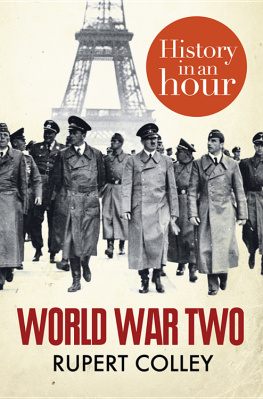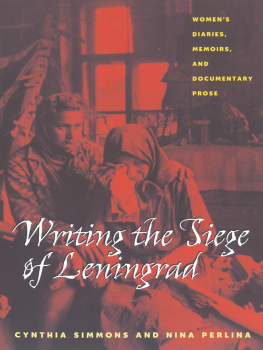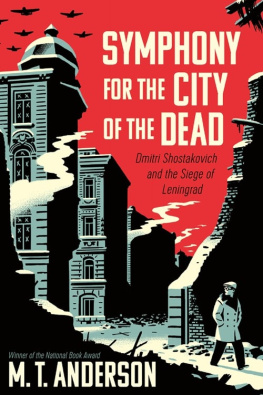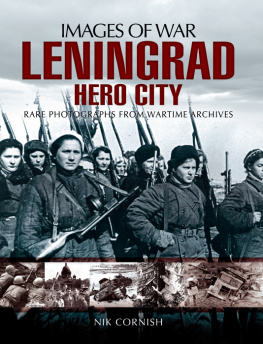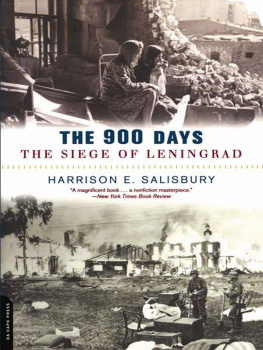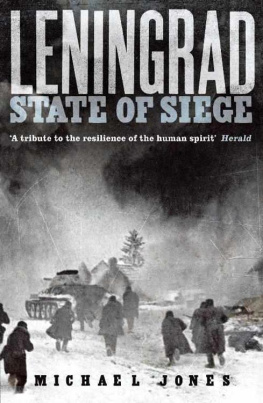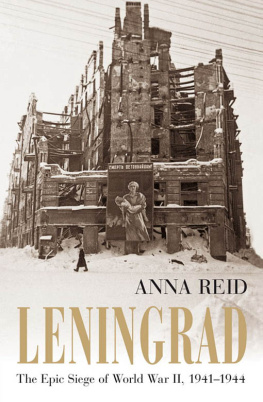The Siege of Leningrad
History in an Hour
Rupert Colley
History in an Hour is a series of ebooks to help the reader learn the basic facts of a given subject area. Everything you need to know is presented in a straightforward narrative and in chronological order. No embedded links to divert your attention, nor a daunting book of 600 pages with a 35-page introduction. Just straight in, to the point, sixty minutes, done. Then, having absorbed the basics, you may feel inspired to explore further. Give yourself sixty minutes and see what you can learn...
To find out more visit http://historyinanhour.com or follow us on twitter: http://twitter.com/historyinanhour
Contents
The Fhrer has decided to wipe the city of Petersburg from the face of the earth. After the defeat of Soviet Russia there is no interest in the further existence of this large inhabited area.
Adolf Hitler
With these words, issued on 22 September 1941, Adolf Hitler effectively sealed Leningrads fate. Preferring to call the city by its pre-revolutionary name, St Petersburg, he declared, We have no interest in saving the lives of the civilian population. Over the next twenty-nine months, German forces encircled the city and subjected it to a devastating siege. The number of deaths in Leningrad exceeded those who died from the atomic bombs at Hiroshima and Nagasaki combined, and constitutes the largest death toll ever recorded in a single city.
For almost nine hundred days, the city resisted the Germans pounding at its gates. Its survival contributed to the defeat of Nazism. But the price was heavy over one million died in Leningrad from German bombs and artillery, or from disease, the cold or starvation. In its suffering Leningrad became a source of symbolic national pride, of good conquering evil. The story of the siege is one of heroic resistance and stoical survival but it also one of unimaginable suffering and extreme deprivation.
This, in an hour, is the Siege of Leningrad.
Named after its founder, Peter the Great, the city of St Petersburg was formed in 1703. Sitting on the mouth of the River Neva, the city, declared the capital of the Russian empire in 1712, developed into a huge flourishing port, the Venice of the North. Influenced by European fashions and tastes, it became Russias window on the West. It was the city of Tolstoy, of French-speaking Russian aristocrats and high culture, theatres, ballet, and art museums. But it also became the city of revolution. In 1905, the city workers downed tools and staged a huge demonstration demanding political and constitutional reform. A petition to be presented to the tsar, Nicholas II, ended in bloodshed on the steps of the Winter Palace, fomenting in the workers a deep hatred of the privileged regime. That hatred would erupt with catastrophic consequences twelve years later.
Vladimir Lenin
In February 1917, at the height of the First World War, the Tsarist government was overthrown and Nicholas II forced to abdicate. A provisional government ruled, but that too was overthrown in October by the Bolsheviks, revolutionary socialists, led by the charismatic Vladimir Lenin. Having come to terms with Germany, thus ending Russias involvement in the Great War, Russia became the Soviet Union and Moscow not St Petersburg its capital. In 1924, following Lenins death, the city was renamed in his honour.
During the mid-1920s, Joseph Stalin emerged from Lenins shadow to take power. Moving slowly but lethally, Stalin gradually removed all opposition and potential dissent, strengthening his control until the peoples of the huge Soviet empire bowed before him. Stalin ruled by fear, purging the Soviet Union of its internal enemies, whether real or imagined. No one was safe, no one was beyond the reach of the NKVD, Stalins secret police, and everyone went to bed fearing a knock on the door in the early hours. Stalin was no fan of Leningrad he resented its reputation as the cradle of the Russian Revolution, in which he played only a minor part. 30,000 Leningraders would fall during the Great Purge of the 1930s, arrested, exiled, or executed, labelled as enemies of the people.
Stalin next turned his vindictive attention to his military, purging his ablest field marshals and generals and decimating the officer corp. 40,000 Red Army personnel, deemed politically out of step, were purged. Amongst the victims were men who called for reform of the Soviet Unions military methods, calls that were, on the whole, ignored. When war came, Stalin found himself bereft of his finest military thinkers. Nikita Khrushchev, Stalins successor, wrote in his memoirs, There is no question that we would have repelled the Fascist invasion much more easily if the upper echelons of the Red Army command hadnt been wiped out. They had been men of considerable expertise and experience.
On 22 June 1941, Hitler launched Operation Barbarossa, Germanys invasion of the Soviet Union, one of the largest and most ambitious attacks ever staged over three million Axis troops attacked along a 900-mile front. What followed was the most destructive war in history; a war of annihilation.
For Hitler, the city of Leningrad held great symbolism, being the birthplace of Bolshevism; his objective was to raze it to the ground and render it uninhabitable. An hour before the attack in the early hours of 22 June, Hitler addressed his troops:
German soldiers, you are about to join battle a hard and crucial battle. The destiny of Europe, the future of the German Reich, the existence of our nation, now lies in your hands alone.
Operation Barbarossa
Bundesarchiv, Bild 101I-186-0184-02A / Otto / CC-BY-SA
Stalins first act was to send Vyacheslav Molotov, his foreign minister, to announce the war to his people. Molotovs radio broadcast, relayed across cities by loudspeaker eight hours after the initial attack, condemned this act of treachery unprecedented in the history of civilized nations.
On 3 July, in his first public address since the invasion, Stalin spoke of The Great Patriotic War. His usual political rhetoric, while still apparent, was played down. Instead, he spoke in patriotic terms, pulling together his people to defeat the beast that was now in their midst: Comrades, citizens, brothers and sisters, men of our Army and Navy! My words are addressed to you, dear friends! he began. He continued, The issue is one of life and death for the Soviet State, of life and death for the peoples of the USSR; the issue is whether the peoples of the Soviet Union shall be free or fall into slavery.
As soon as war was announced, Leningrad was placed under martial law. The writer Lidiya Ginzburg described the immediate change of atmosphere within the city:
Less than half an hour had passed and we were already being borne away inexorably from our pre-war emotional cast of mind. [We had] a feeling... that this life was coming to an end.
On 27 June, Andrei Zhdanov, Stalins man in Leningrad, issued orders for the mobilization of the citys population to bolster its defences. Unless sick, pregnant, caring for infants, or otherwise engaged by the city authorities or the military, all men aged between sixteen and fifty, and women between sixteen and forty-five were called up. They were to work for seven days followed by four days rest when they would be expected to return to their normal jobs or studies. In August the age range was extended up to fifty-five for men and fifty for women. Work shifts were increased too seven days work, then one day of rest.


